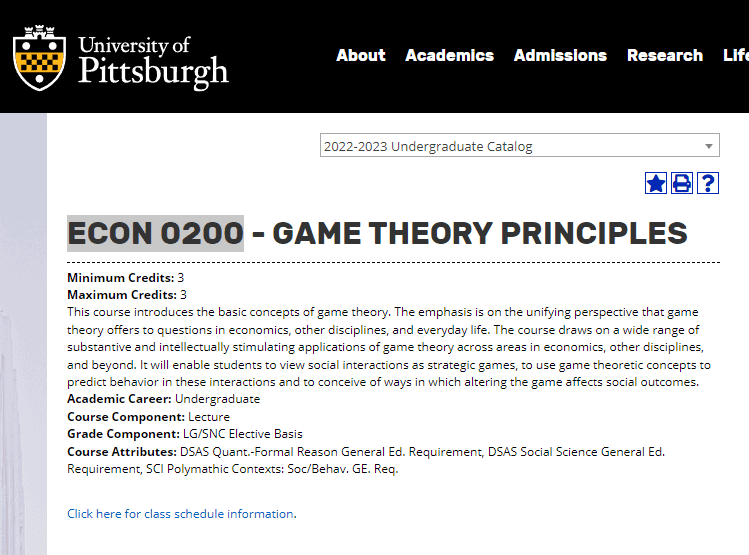Statistics-lab™可以为您提供pitt.edu ECON0200 Game Theory博弈论课程的代写代考和辅导服务!

ECON0200 Game Theory课程简介
The course may cover topics such as game theory, mechanism design, computational finance, and data analysis. Students may learn how to use programming languages and software tools to build and analyze economic models and simulations, and may also study how to apply these techniques to real-world economic problems.
Overall, this course seems to combine elements of economics, computer science, and mathematics to provide students with a unique set of skills and knowledge for analyzing and designing economic systems in a rapidly changing and increasingly complex world.
PREREQUISITES
Project details and timeline
Project details and ideas can be found here (UW access only).
- Feb 22: Short description of topic, goals and project team due (as part of HW1).
- Mar 22: Up to one page report of progress, reference material, plans for the remainder of the semester. Before this date, please make an appointment with Shuchi to discuss potential topics and references.
- May 3: Final project reports due.
- May 5: Two projects (selected on the basis of the final reports) to be showcased during this lecture.
ECON0200 Game Theory HELP(EXAM HELP, ONLINE TUTOR)
$\chi_{\omega,(r, s)}$ is a decreasing function of $\omega$ for every $r, s \in \mathcal{R}$. Furthermore, $\lim {\omega \rightarrow \infty} \chi{\omega,(r, s)}<1$
Proof: The first part of the lemma follows from that $\mathcal{R}{\omega, s}$ is a decreasing function of $\omega$. To prove the second part of the lemma, since $\lim {\omega \rightarrow \infty} \mathcal{R}{\omega, s}=1$, observe that $$ \lim {\omega \rightarrow \infty} \chi_{\omega,(r, s)}=\frac{\rho\left(1-\delta_{l_r}\left(m_r\right)\right) \alpha_r\left(1-\eta_r\right)}{1-\rho\left(1-\delta_{l_r}\left(m_r\right)\right)\left(\left(\frac{\overline{\overline{ }(1-\rho)+\rho q}}{1-\rho+\rho q}-\alpha_r\left(1-\mathrm{e}^{-\lambda_r}\right)\left(1-\eta_r\right)\right)\right)}\left(1-\mathrm{e}^{-\lambda_r}\right)<1 .
$$
A consequence of the above result is the following.
The attacker prefers attacking resource $s$ over listening to resource $r$ for some $\omega \geq \tilde{\omega}_{(r, s)}$, and after attacking, the attacker always prefers attacking.
Proof: For the initial values of the rewards, we assign zero reward for every $\omega$; i.e. $J_\omega^{(0)}=0 \forall \omega$. Regarding the first iteration of the value updates, since
$$
J_{\omega \perp, r}^{(1)}=\frac{K_{\omega, r}^{(0)}}{1-U_r}=\frac{\rho\left(1-\delta_{l_r}\left(m_r\right)\right) \alpha_r\left(1-\eta_r\right)}{1-U_r} \sum_{n=1}^{\infty} \frac{\mathrm{e}^{-\lambda_r} \lambda_r^n}{n !} J_{\omega+n}^{(0)}=0
$$
for $r \in \mathcal{R}$, i.e. all listening rewards are zero, attacking would be the optimal choice for every $\omega$. Then, $J_{\omega, L, r}^{(1)}=0$ and $J_{\omega, A, s}^{(1)}=\mathcal{A}{\omega, s}=\frac{C{\omega, s}}{1-T_{\omega \omega s}}$ hold $\forall \omega, r, s$, which implies $J_{\omega, }^{(1)}=\mathcal{A}\omega^=\max {i \in[1, \ldots, R}} \mathcal{A}{\omega, 1} \forall \omega$. In the second iteration, the attacking rewards do not change; i.e. $J{\omega, A, s}^{(2)}=\frac{c_{\omega s}}{1-T_{\omega,}} \forall \omega, s$. Regarding the listening rewards, for every $\omega$, similar to (11.14), we obtain
$$
\begin{aligned}
J_{\omega, L, r}^{(2)} & =\frac{K_{\omega, r}^{(1)}}{1-U_r}=\frac{\rho\left(1-\delta_{l_r}\left(m_r\right)\right) \alpha_r\left(1-\eta_r\right)}{1-U_r} \sum_{n=1}^{\infty} \frac{\mathrm{e}^{-\lambda_r} \lambda_r^n}{n !} \mathcal{A}\omega^* \ & =\mathcal{A}\omega^* \underbrace{\frac{\rho\left(1-\delta_{l_r}\left(m_r\right)\right) \alpha_r\left(1-\eta_r\right)}{1-U_r} \sum_{n=1}^{\infty} \frac{\mathrm{e}^{-\lambda_r} \lambda_r^n}{n !}\left(\prod_{l=0}^{n-1} \frac{\mathcal{A}{\omega+1+1}^}{\mathcal{A}{\omega+1}^}\right)}{\chi{\infty, n)}^} . \end{aligned} $$ Since $\chi_{\omega,(r)}^$ is not necessarily a decreasing function of $\omega$, in the second iteration, the monotonic relation between the listening and attacking rewards cannot be directly established as in the single-resource case discussed below.
Textbooks
• An Introduction to Stochastic Modeling, Fourth Edition by Pinsky and Karlin (freely
available through the university library here)
• Essentials of Stochastic Processes, Third Edition by Durrett (freely available through
the university library here)
To reiterate, the textbooks are freely available through the university library. Note that
you must be connected to the university Wi-Fi or VPN to access the ebooks from the library
links. Furthermore, the library links take some time to populate, so do not be alarmed if
the webpage looks bare for a few seconds.

Statistics-lab™可以为您提供pitt.edu ECON0200 Game Theory博弈论课程的代写代考和辅导服务! 请认准Statistics-lab™. Statistics-lab™为您的留学生涯保驾护航。